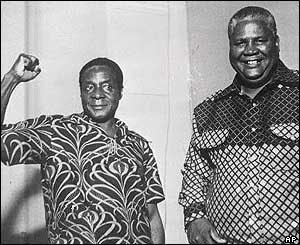
It is now crystal clear that the indigenisation and
Empowerment bill has now fully been assented to by the head
of state meaning that it now constitutes a law of the land.
The construct of the indigenisation law is a paradox to the
broader aspirations of the independence and it is now
certain that the excesses of Zimbabwe's economic rights
movement have conceived anarchism in place of a safe,
secure, free and liberated Zimbabwe.
It is imperative that I mention that company owners are
being victimised and are no longer psychologically secure
after government has vilified and labelled them saboteurs.
It is within this context that the price slash was conceived
to inflict injury on them and much still this law is
designed to totally alienate these people who worked hard,
some for centuries to create huge and valuable assets which
are about to be unconditionally taken up by a cabal of
people. After the masses have endured a harsh legacy of farm
seizures, the enactment of the indigenisation law should
form part of the broader debate about our economic destiny
as a nation.
Despite all these excesses independence was ironically about
advancing the cause of competition and an unhindered
progress without consideration for class, creed, race and
sex. The African brand of Independence was about creating a
fair, humanistic and egalitarian society-thus the law is
historically and racially misplaced to advance the cause of
independence in Zimbabwe. The law is an equivalent of a
legalised expropriation of assets owned by private interests
since it compels that all businesses and companies cede 51%
shareholding to indigenous black interests.
Cede 51% to whom? When we are fully aware that the economic
crisis has demobilised the capacity for the poor to mobilise
resources for participation in equity ownership. This raises
ethical considerations as to who will be the exact
beneficiaries of this legislation? The histrionic cabals of
the Zimbabwean leadership are at it again to amass company
equity adding on top to the seized land. It boggles my mind
why some individuals are comfortable to sit on assets that
are all derived from seizures and can all be properly termed
loot.
Zimbabwe is one of the rare countries where a cabal of
individuals discovers wealth over night without much hard
work and serious planning as happened in the case of the
seizure of farms and the associated farms assets. Are our
poor mothers in the rural areas going to sell off their
chickens and goats so as to pool resources in order to
acquire equity or is it the same histrionic cabal forces
that benefited from the farm seizures that are going to
benefit again? This seems likely considering the economic
dearth of the middle class and the alienation of the
Diaspora who in normal democratic value driven societies are
supposed to be the integral beneficiaries of any true
indigenisation and empowerment programme.
Most successful companies have a strategic fit; which is the
alignment of the mission, vision, goals, strategy,
programmes, policies and objectives in a business. It is
usually the duty of the founders of the company to project
their vision so that it consequently underpins the strategic
fit of the company. Companies are also formed to celebrate
power and self-esteem, which is projected through a personal
model of a strategic fit. How will foreign entrepreneurs in
Zimbabwe enjoy and celebrate the power and self-esteem
component in entrepreneurship when they have mandatory 49%
maximum equity?
It can be postulated that the unconditional takeover of the
51% equity will result in the company derailing from the
founding strategic fit because they will possibly be;
dilution and diversion of the strategic fit giving birth to
confusion because founders will now be controlled by
'Jonis come late' and people with other interests which
are not in alignment with those of founders especially
considering that it will be the same unfitting histrionic
cabals who are strategically positioned to take up most
stakes in private companies.
The law is silent about what will happen to listed entities?
Company's list in order to raise capital and enlist a
diversified ownership; which obviously takes into context
the indigenous black people. How will trade on the local
bourse be regulated and will it have a racial trading
aspect? Trading on the stock exchange is usually on a first
come first to buy or sell basis yet the indigenisation law
is silent about how this racial component will be instituted
in order to achieve the 51% indigenisation target at any
moment.
Mutumwa Mawere a seasoned and an accomplished Zimbabwean
born entrepreneur in his article Does indigenisation
threaten the law of succession argues that;
"In the case of Zimbabwe, where race has now been elevated
to the most significant national question, it is not
evident what will happen to black Zimbabweans married to
whites who may qualify as beneficiaries of indigenisation.
Would their successors who may well be white be eligible to
keep the rights and transfer them in line with succession
laws with no risk of the state seeking to negotiate such
rights on account of race?"
This highlights the deficiencies in the long-term
sustainability of the indigenisation law as a viable and
non-conflicting state intervention. Mawere further goes
in-depth to suggest that "The decisions that are made by
our generation have an enduring impact on the future of our
continent and yet little or no thought is applied to the
unintended consequences of policy instruments that may have
conflicting and multiple objectives"
If Zimbabwe continues to further this path concern is that
the so called indigenous black people will in fact inherit
factory and industrial shells after the founders of the
company will have moved their movable factors of
production-capital flight. The capacity of the companies to
mobilise local and offshore funding will be severely
constrained given the sudden changes in ownership and worse
still banks have already indicated reluctance to fund the
indigenisation programme; this will drive an already injured
economy to an economic hell.
The seizure of white owned farms provides testimony to the
fact that coercive redistribution of wealth is not a
solution for enriching historically disadvantaged indigenous
people. It is clear that entrepreneurship has a
psycho-social element and as such discovering or
re-allocating assets does not guarantee that the assets will
be put to good use or that beneficiaries will improve their
welfare, and consequently like in the case of the disastrous
land reform programme we will only succeeded in destroying
employment, livelihoods and run down an already injured
jewel of Africa. What people need is a stable economic
environment that allows them to work hard for their wealth
not to ululate after being handed over assets.
The presents of an election should inspire the masses who
have endured this current brand of localisation of ownership
of means of production to vote for an aspirant who values
hard work and competition-a contest for the rule of law and
a nationally inclusive independence. Voters should weigh the
obvious merits of hard work versus benefiting from coercive
redistribution of wealth.
I believe most people would agree that indigenisation forms
part of the necessary state interventions designed to
liberalise and democratise the economic world but most would
contend that an indigenisation of a magnitude as high as 51%
will produce unintended consequences and is self-defeating.
My thesis is that an indigenisation of such levels
undermines the African brand; it posits Africans as
practicing reverse racism, seizing and expropriating assets
since the indigenisation law has a racial tone. Investors
will be left to wonder if their assets are really secure in
Africa given that evidence has shown that most occurrences
in postcolonial African states do occur or reappear in other
postcolonial states.
And indeed if the government is serious at all about its
citizen participating in the economy it must privatise some
of the loss making parastatals with indigenous people in
mind but instead this new law seeks to allocate some of the
equity to government possibly to create a very rich and
moral blameworthy government. This is despite the massive
failure of government as an entrepreneur and manager.
After the failure of development aid as a remedy to poverty,
sovereign wealth funds (SWF) and foreign direct investments
(FDI) have emerged as better vehicles for poverty
eradication. Zimbabwe should instead be harnessing and
encouraging foreign investors who are critical in providing
the much needed foreign currency to import critical raw
materials, fuel and electricity for production purposes. In
short to turn-around Zimbabwe's economy we need to go back
to the basics-and indeed it needs not an internationally
acclaimed consultant but simple men in the street.
Hillary Kundishora is a scholar of strategic management. He
can be contacted on hkundishora@yahoo.co.uk and join more
discourse on vision prosperity at
www.zimchaiyo.blogspot.com














